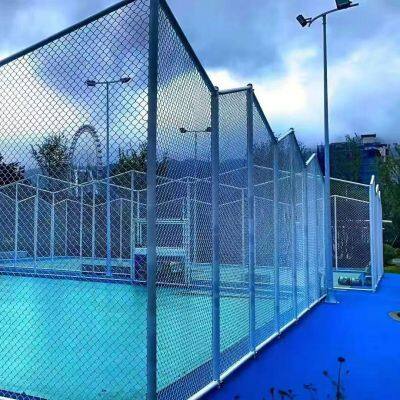-
 Liu
Hi there! Welcome to my shop. Let me know if you have any questions.
Liu
Hi there! Welcome to my shop. Let me know if you have any questions.
Your message has exceeded the limit.

Different Types of Metal Fences: Choosing the Right Metal Fence for Your Property
2025-10-08 23:57:11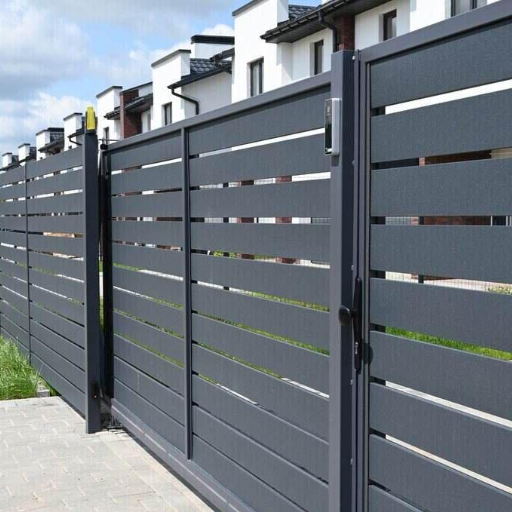
When it comes to safeguarding and accessorizing the property, metal fences come in place as a versatile and durable solution. The choices are star-studded-from an iron wrought fence with an old-world appeal to a blue half-slice aluminum in profile and color-so choosing the right kind of metal fence could either be exciting or daunting. Every kind of metal fence has its own benefits, depending on its requirements for strength, maintenance, design, and budget. This article aims to provide a walkthrough of different types of metal fences regarding their composition, strength, benefits, and ideal applications. Be it security, style, or longevity general review of metal fence types would allow you to take an educated decision, fine-tuned to your individual needs. Find more info now
Comprehending Metal Fences
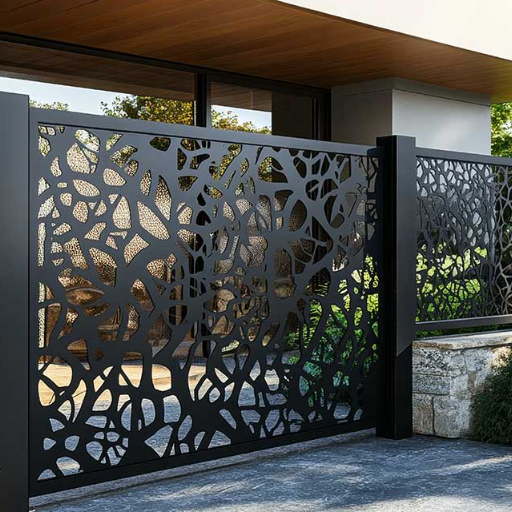
Metal fences are popular because they are strong, flexible, and long-lived. Wrought iron, steel, aluminum, and chain link are some of their popular options, each with its own pros and cons. Wrought iron is famous for its strength and classic look, steel for being better at resisting impacts, aluminum for being light and corrosion-resistant and low-maintenance in places of high humidity, while chain link fences are cheap and practical for securing large tracts of land. The right choice of metal fence will therefore depend upon your budget, upkeep, and purpose: either security, aesthetics, or merely delimiting an area.
What is a Metal Fence?
A metal fence is a structure manufactured from various types of metal materials, such as iron, steel, aluminum, or chain link, to enclose, protect areas and provide a boundary line. Being one of the most durable, strongest, and versatile fences, it serves several purposes-high-level security, beautification, and setting out property lines. Metal fences come in endless configurations and finishes so that they can suit residential, commercial, and industrial needs. Variables, including but not limited to the type of material, environmental conditions, and intended functionality, will all weigh in on what stands best for specific needs.
Advantages of Metal Fencing
The advantages of metal fencing have made it preferable for different applications. A good feature of it is durability, where fencing offers long performance under harsh weather conditions with little maintenance. Usually constructed from steel, aluminum, or wrought iron, metal fences offer more strength for security purposes to protect a property from intrusion. Considering design, height, and finish, they offer good customization options so that property owners can choose what best suits the functional needs and design they envisage. Metal fences are environmentally friendly, as some of the materials used can be recycled for eco-friendly practices. All these factors make metal fencing a practical and trusty choice for residential as well as commercial purposes.
Common Types of Metal Fencing
The common types of metal fencing include wrought iron, aluminum, steel, and chain link. Wrought iron fences are attractive with their ornamental designs, but also provide strength and security. Aluminum fencing is lightweight, rust-resistant, and largely maintenance-free, making it ideal for residential properties, while steel fencing is very secure and strong, suited to applications for commercial and high-security purposes. Chain link fences, even if they really do not look nice, are economically priced and offer reliable perimeter control with very little effort in installation. Each type has distinct characteristics to fit specific needs, thereby presenting property owners with an extremely versatile set of options.
Types of Metal Fences
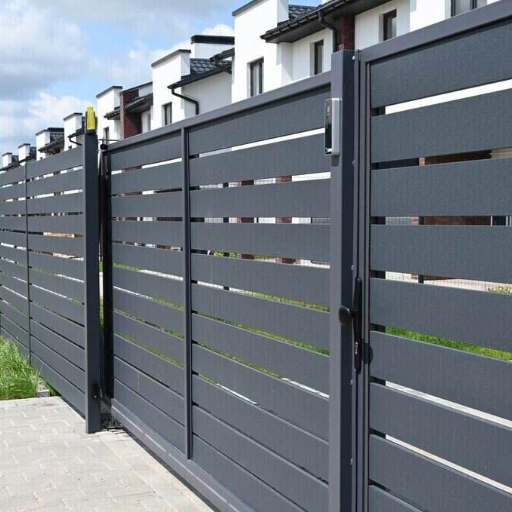
1. Wrought Iron Fence
Known for its durability and classic aesthetic appeal, wrought iron fences provide not only excellent security but also customized design options, thus being widely used for decorating homes as well as commercial buildings. Maintenance is the only drawback since these fences need to be kept rust-free.
2. Aluminum Fence
Aluminum fences remain lightweight and highly anticorrosive, especially suited to high-humidity or coastal conditions. They are low-maintenance and offered in a selection of styles, so they make an excellent fit for almost any kind of property.
3. Steel Fences Are Made for Variables of Strength
Steel fences are the strongest fencing option and thus widely used in high-security and industrial settings. They usually come with galvanized or powder-coated steel finishes that prevent rust and add to the life of the fences.
4. Chain Link
Chain link fences provide an affordable yet practical solution to secure a perimeter. The installation is faster than most other types, it is very durable, and it needs very little maintenance, thereby becoming a popular option for both temporary and permanent fences.
Wrought Iron Fences
Famed for elegance, wrought iron gates and fences are strong and very versatile. Made from good-quality iron, they are extremely sturdy and stand well against adverse weather conditions. They lend themselves to residential, commercial, and ornamental applications wherein both security and beauty are required. Wrought iron fences may be furnished with intricate designs that complement architectural styles, giving them a secure boundary. They usually need to be painted regularly for protection or given a specific treatment to keep rust from corroding them.
Chain Link Fences
Chain link fences, having the necessity, provide durable and cost-effective solutions for residential and industrial purposes. Made of galvanized or coated steel wires, chain link fences provide the security that needs minimal care. Chain link fences will resist rust and can stand all-weather conditions, and installation procedures that do not take long. The compact design of the chain link fence facilitates visibility, making the fence ideal for applications such as enclosing sports fields, backyards, or parking lots. Although chain link fences are not as intricate in design as the wrought iron ones, they can be enhanced with slats for privacy or colored coatings to match particular design requirements.
Ornamental Metal Fences
Ornamental metal fences have an appealing balance between durability and decoration, which creates interest in their use in residential and commercial properties. Made from aluminum, steel, or iron, these fences are all constructed to resist corrosion and endure adverse environmental conditions while requiring very little upkeep. Their design intricacy and customizable options place them on beauty's side to increase any property's aesthetic charm. Ornamental metal fencing can also be given a protective finish to increase their life and complement a particular design, a marriage between function and beauty.
Choosing the Right Metal Fence
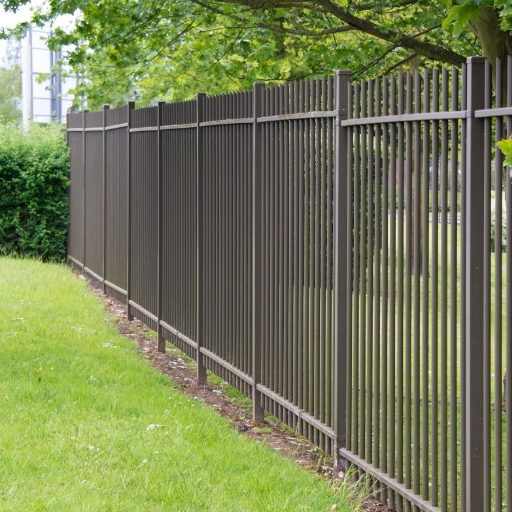
For selecting the correct metal fence, the first step is to go over your needs, such as security needs versus aesthetic considerations, with some considerations for durability. Therefore, if high security is in question, then steel fences are the more preferable choice as it is stronger and more robust. Aluminum fencing is lighter and corrosion-resistant, making it an ideal choice for residential applications if low maintenance is the concern. Wrought iron fences are heavier, more traditional in their look, and in some ways, classically beautiful while requiring upkeep to prevent rusting. Consider climate guards, project purport, and budget in your decision. It might also be wise to consult the supplier or contracting firm so that proper installation and performance can be guaranteed far into the future.
Factors of Consideration
Consider fencing materials while evaluating local climatic conditions. For areas prone to heavy humidity or rainfall, materials like aluminum or vinyl that do not react to corrosion or moisture damage are ideal; besides, wrought iron may have to get along with periodic treatments to protect itself. Another scenario is the intended use: for example, the focus on privacy may lean towards solid panel designs, whereas a decorative-oriented one may opt for ornamental fencing. Price-wise, the best consideration will weigh the hardship of investment against that of maintenance of the fence itself. A consultation with a professional is well-paid off when the chosen type of fence meets both the functional and aesthetic needs while making sure it is properly installed under measures guaranteeing longevity.
Metals Suitable for Fences
Metals suitable for fencing vary in the mechanisms of assuring durability, maintenance, cost efficiency, and impact of environmental conditions. Aluminum stands as an option, lightweight, non-corrosive, and with very little maintenance in areas with high humidity or saline environments, yet lacks sufficient strength to oppose a steel fence in impacts. Steel is the best when it comes to strength and security; it will rust when left without protective coatings, however, and it must be regularly maintained. Wrought iron has high corrosion protection capability, provided periodic maintenance, and aesthetic value, but it is found to be costly to maintain. For those on a lean budget, chain-link fencing could always be a choice, fairly cheap and functional but somewhat visually unappealing. The iron hand depends on weighing the functional needs, environmental considerations, and budget constraints.
Metal Fence for the Property
The choice of a metal fence for your property essentially depends on the necessities and limitations that are peculiar to you. However, aluminum will definitely be the most cheap, corrosion-resistant solution for whatever setting, if durability and low maintenance are considerations. Wrought iron, by contrast, is more fitting for properties exuding the traditional charm or for those looking for the fine aesthetics it conveys with its superior strength, and elevated costs and maintenance. Chain-link fencing will offer a much-needed solution in terms of affordability and utility, whereas the design simply may not agree with aesthetics. Finally, the right choice shall be concluded upon by putting together the budget, durability requirements, visual appeal, and environmental conditions of your property.
Fence Installation and Maintenance
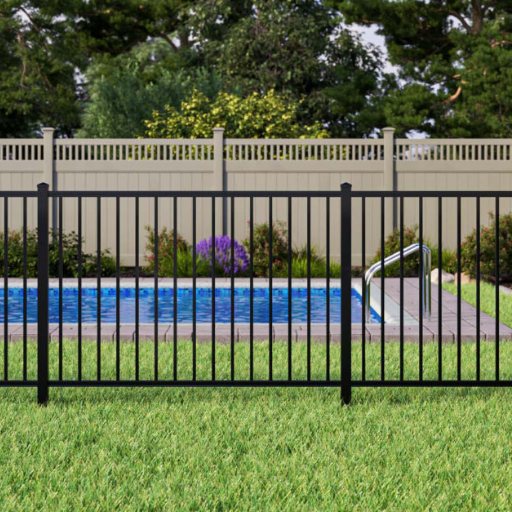
Installation
Site Preparation: Clean the area of any debris. Mark the property lines so that there is no encroachment upon neighboring properties. At this stage, one must ensure obedience to local regulations or zoning requirements.
Materials and Tools: Materials should be of top quality, suitable for the fence type and climate of the region. Typical tools include a post hole digger, a level, and concrete for setting the posts.
Proper Alignment: Install the fence posts at regular intervals, ensuring they are plumb and stable before erecting panels or rails.
Maintenance
Regular Inspection: Such periodic inspections should be carried out to establish and detect damages like rust, rot, or loosening of any components. Addressing such issues immediately halts further deterioration.
Cleaning: Periodic cleaning of the fence should be done, depending on the material-soap and water for vinyl, rust removers for wrought iron, and resealing for wooden ones.
Protective Treatments: Protective sealants or paints, if applicable, may be applied to enhance the life span of the fence, especially where the weather does its worst.
Adhering to these practices will render your fence durable, functional, and beautiful through time.
Installing a Metal Fence
To be of durable and functional value, a metal fence must be architecturally precise in planning and execution. The installation procedure ordinarily begins with outlining the linear perimeter and demarcation of each post location so as to guarantee correctness. Depending on the height of the fence, the digging of post holes usually ranges from a third of the post length; concrete is then used to hold the post in place, thus giving them maximum strength. Posts should then be aligned before the concrete begins to set, thereby ensuring uniformity throughout. Once the concrete has hardened enough to hold the posts firmly, metal panels, or metal rails, are attached with the correct hardware, ensuring that everything is level and securely fastened. Finally, check the installation for any alignment problems or loose components, and coat the metal with a rust-proof coating to keep it from environmental wear and tear.
Maintenance Tips for Metal Fences
To maintain a metal fence, I make sure to inspect it regularly. I look out for rust spots, any loose fasteners, or signs of damage to the structure. Once a rust spot is noticed, I use a wire brush to remove it and then apply a rust-inhibiting primer and paint to prevent further rusting. For cleaning, I usually just use mild soap and water to clean off any dirt or debris, especially after harsh weather. I do, however, check for loose parts and tighten or replace them accordingly. And ounces of prevention keep rust away: descaling every so often is on my list to protect the metal from environmental wear and tear.
Long-term Care for Wrought Iron and Aluminum Fences
Regular maintenance is key to extending the lifespan of your wrought iron or aluminum fence. Inspections should at least be held twice yearly, with a focus on checks for evidence of corrosion, loose fasteners, or the presence of any damaged sections. When working on wrought iron fences, any rust observed on either should be tackled immediately, sanding the areas affected and using a rust-inhibiting primer and paint so as to halt further development. Although aluminum fences resist corrosion more, they must still be washed on a regular basis with mild soap and water to dry off all grime and dirt, which cause discoloration. Meanwhile, both of these will need reapplication of a good quality protective coating or finish in due course. Also, all hardware components, such as screws and brackets, must be checked to be sure that they are tight and firmly fastened for structural support. Taking care of your fence will greatly improve the durability of the structure, leaving it looking attractive for years to come.
Frequently Asked Questions (FAQs)
How do I choose the right fence style for my property?
When choosing a fence style for your property, you should look into several factors such as the purpose of the fence, the landscape, and any relevant local regulations. Metal fences come in all sorts of styles: from decorative wrought iron to prosaic chain link fences. Weigh in on whether you want a privacy fence or a security fence. Many metal fences can provide a good degree of privacy while still increasing the value of the property. A local fence company can help you explore metal fence options best suited to your needs and preferences.
What are the perks of having a corrugated metal fence?
A corrugated metal fence is a great choice because of its sleek looks and sturdy durability. Constructed from either galvanized steel or aluminum, corrugated metal panels can resist harsh weather and at the same time offer a very attractive appearance. Likewise, these fences are low maintenance and are available in Custom colors to complement curb appeal. Importantly, the corrugated metal fence retains style yet offers security and privacy. Usually, they require fewer posts, which makes them cheaper to install.
Are chain link style fences a good alternative for security?
Chain-link fences are popularly chosen for their affordability and capability to provide security. They are forged from galvanized steel, providing great strength and in corrosion. The fences also allow visibility while delineating property boundaries, something which may be crucial for commercial fencing. If the chain-link fence is indeed a concern for privacy, it can be combined with privacy slats or metal privacy screens. Overall, they are a practical choice for those who secure their property on a budget.
What makes wrought iron fences the popular choice?
Known for their classic beauty and strength, wrought iron fences have stood the test of time for residential properties and commercial buildings. These fences generally go at a higher price tag than any other type of metal fences, where it priced-for its value based on its durability and the sight of beauty it can bring with it for the enhancement of the property. Wrought iron can also be designed in different styles to suit different architectural themes to confer elegance to the place while granting security. Also, they were strong enough to stand black weather conditions, so they could be long-lasting in terms of fencing. In terms of maintenance, it will last for a lifetime, upon which you will have to maintain it to keep it looking good for years ahead.
Tags: Metal Fences
